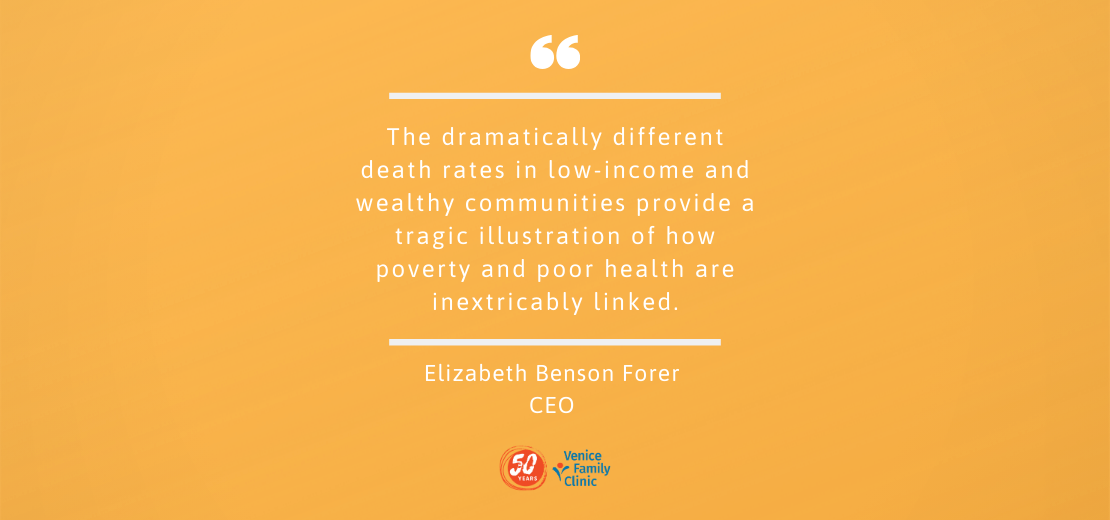FOR IMMEDIATE RELEASE
Contact:
Laura Mecoy
(310) 546-5860
Laura@mecoy.net
VENICE FAMILY CLINIC STATEMENT ON REPORTS THAT PEOPLE IN POVERTY MUCH MORE LIKELY TO DIE FROM COVID-19
Tragic Consequences Illustrate Importance of Health Care Access In Protecting Community Health
LOS ANGELES – (May 4, 2020) – Following is a statement from Elizabeth Benson Forer, chief executive officer and executive director of Venice Family Clinic, a nonprofit community health center that provides comprehensive care to people in need, regarding L.A. County Department of Public Health’s reports of higher COVID-19 death rates in low-income communities.
The Department recently reported that people living in low-income areas are three times more likely to die from COVID-19 than people living in wealthier communities. Los Angeles County Public Health Director Barbara Ferrer has said that higher instances of underlying health conditions and crowded living conditions lead to more transmission of the virus and lack of access to health care contributed to the higher death rate in poorer neighborhoods.
“The dramatically different death rates in low-income and wealthy communities provide a tragic illustration of how poverty and poor health are inextricably linked. Higher rates of illness are found in low-income communities where people are more likely to be exposed to poor air quality and other environmental hazards that affect health and have limited access to healthy foods, safe neighborhoods, stable housing and education,” Ms. Forer said. “Low-income communities also have higher rates of asthma and cancer – both of which have been cited as underlying conditions that pose a greater risk of death when infected with COVID-19.
“At Venice Family Clinic, our nearly 28,000 patients have access to high quality, comprehensive care through one of our 12 locations. But our patients often lack the basic tools needed to detect and monitor illness or the resources to isolate themselves from others. Some do not have a thermometer to check for fever or the money to buy one. Others budget their finances by sharing small apartments with extended family members, which makes any necessary self-isolation due to COVID-19 extremely difficult.
“The COVID-19 pandemic has made abundantly clear that the health of entire communities relies on the most vulnerable among us – including the people who work in our homes, drive our ride share vehicles and deliver our groceries. These essential workers put their own health at risk to serve the needs of other people, and that makes their health care essential for all of California.
“Community health centers, like Venice Family Clinic, are the medical home for one in six Californians. In Los Angeles County, community health centers care for 1.7 million low-income men, women and children. We are well-established institutions in the communities we serve, with our health care teams often sharing the same languages, cultures and experiences.
“As a result, community health centers are the ideal partners for the state, counties and cities preparing to expand testing and contact tracing in low-income communities. We are already trusted members of the communities we serve, and we have the facilities and dedicated health care providers needed to effectively administer COVID-19 testing and contact tracing programs among people in need.”
About Venice Family Clinic
Venice Family Clinic is a leader in providing comprehensive, high-quality primary health care to people living in poverty. Now celebrating its 50th anniversary this year, the Clinic has grown from a small storefront operation into one of Los Angeles’ leading community health centers, providing care to nearly 28,000 men, women and children annually through 12 sites in Venice, Santa Monica, Mar Vista, Inglewood and Culver City. The Clinic leads the way in providing comprehensive and integrated care by creating a one-stop health system that offers multiple services, often at the same locations and same time as primary care appointments. These services include dental care, substance use treatment, mental health services, vision screenings, child development classes, health education, prescription medications, domestic violence counseling, HIV/AIDS services, street medicine for people experiencing homelessness and health insurance enrollment services. For more information, visit VeniceFamilyClinic.org. Follow us on Facebook, Twitter and Instagram.
